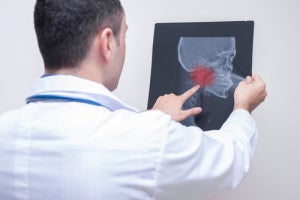Unfortunately, it is difficult to determine the direct cause of temporomandibular joint disorders Dental professionals are in agreement that TMJ disorders can be connected to the joint and muscles involved in opening and closing the jaw.
According to the Academy of Orofacial Pain, the causes of temporomandibular joint disorders are unclear because in many cases, there are multiple contributing factors. These may include:

- Genetic predisposition
- Hormones
- Autoimmune diseases
- Infection
- Arthritis
- Teeth clenching/grinding
- Jaw injury
- Dental procedures
- Joint degeneration
- Disc displacement
Teeth grinding had previously been considered a direct cause of TMJ pain, but research has shown that many who grind their teeth never experience discomfort. In addition, an individual with a sore jaw is often less likely to grind due to the pain.
Orthodontic treatment was also considered a possible explanation, but that idea has been dismissed with scientific evidence. Studies are underway that consider the linkage between TMJ disorders and hormones due to the higher incidence of the condition among women.
Temporomandibular disorders (TMDs) are classified into two categories: myogenous and arthrogenous.
- Myogenous refers to a condition affecting the masticatory muscles, often brought on by tension, imbalance, or overwork by certain muscles.
- Arthrogenous relates to a problem of the temporomandibular joint, involving the hard or soft tissues, discs, and/or arthritis.
Diagnosis of a Temporomandibular Joint Disorder
A prosthodontist has advanced training in dental restoration and disorders related to the facial structures. If you suspect a TMJ disorder because of the pain you are experiencing in your jaw, neck, and/or head, you should seek such specialized treatment. Common symptoms include jaw tenderness, muscle spasm, misalignment, and clicking when opening the mouth.
Your appointment will begin with a review of your medical history and a physical examination to check for these symptoms. However, because these symptoms are not exclusive to TMJ disorders, you may also be screened for other conditions to rule out other causes.
An accurate diagnosis is essential because certain treatments are only effective for particular types of TMJ disorders. For example, a myogenic muscular problem will not benefit from surgery to the joint. Many problems get better with time, which is why conservative treatments are usually recommended first. In fact, simple treatment methods that can be performed at home are effective for TMJ pain relief in the majority of patients.
Temporomandibular Joint Disorder Treatment
If you have a TMJ disorder, you can combine treatment methods for the best results:
- Diet. The first step is to alleviate the stress being placed on the muscle and joint by eating soft foods. Try to avoid foods that require more chewing to give your joint a rest. You can also cut food into smaller pieces so that you don’t have to chew as much. Many people’s symptoms will improve within three weeks just using a soft-food diet.
- Ice packs and moist heat. Many people report improvement with a routine that includes icing and moist heat application. Icing helps to reduce inflammation, while moist heat can help the tight muscles to relax. You can apply each for about 10 minutes at a time.
- Stretching exercises. Stretching aids in elongating tight muscles and reducing tension in the jaw. When you visit the dentist, you can ask about rehabilitation exercises that will be most effective for your specific condition. Exercises can be combined with other techniques such as biofeedback and meditation, which have been successful in some cases.
Depending on the nature of your disorder, you may be recommended injections or other prescription medications to provide pain relief. Use of a night guard may also help when clenching or grinding are a frequent problem.
Expert Treatment at Penn Dental Medicine
As we have seen, TMJ disorders are complex, multi-faceted conditions that require a precise diagnosis in order to ensure the most effective treatment. This is why it is important to seek treatment from a specialist, or a specialist in training. If you or a family member have been suffering from TMJ pain, it’s time to get the answers you’ve been waiting for. You can schedule a free initial prosthodontics consultation with the student dentists at Penn Dental Medicine by calling 215-898-8965 today.

